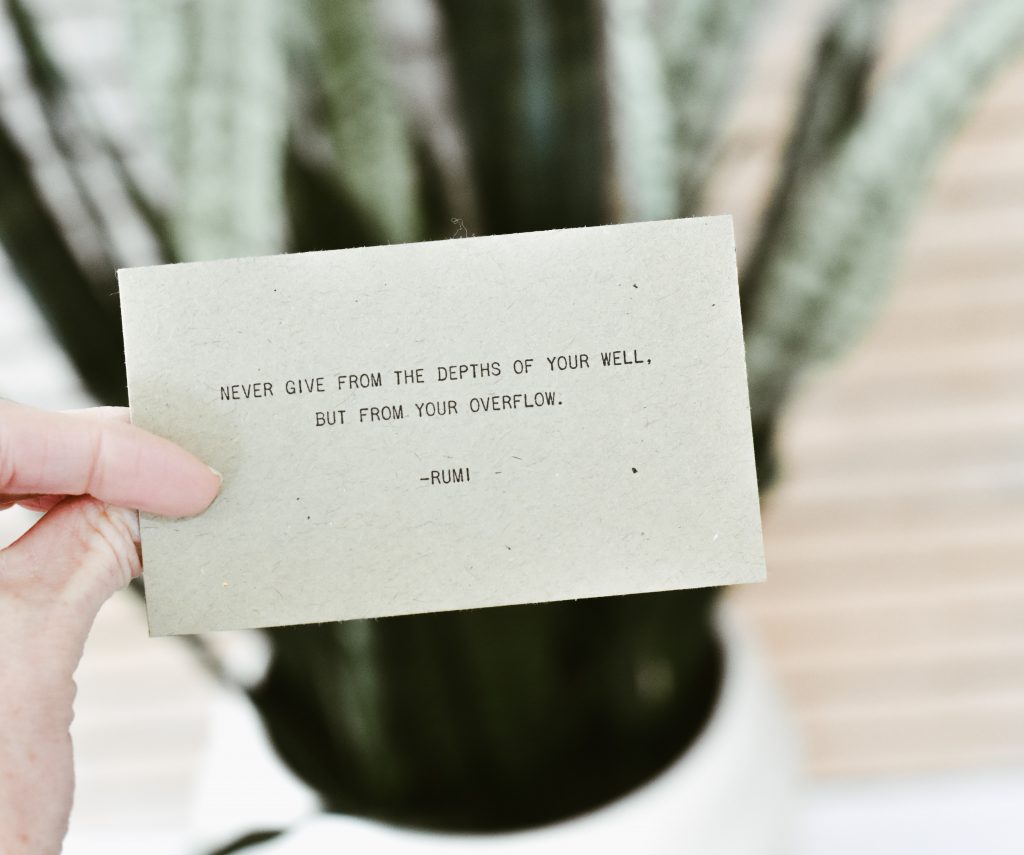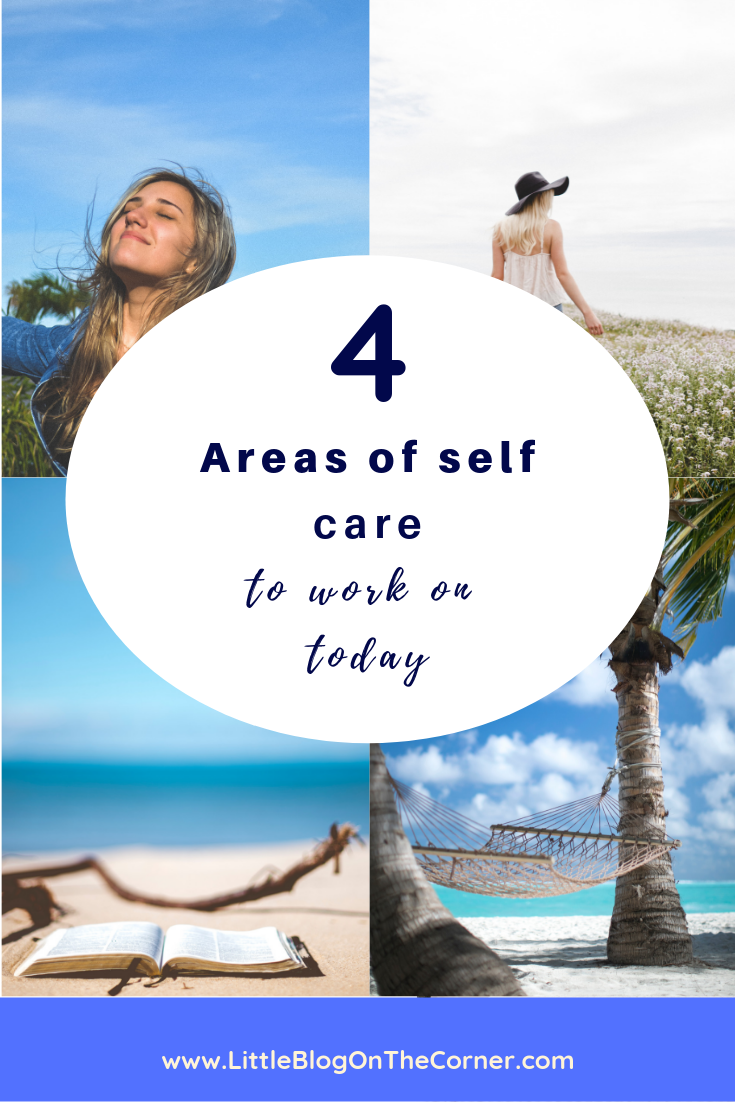Create a Self Care Plan
what is self-Care?

According to psychcentral.com, “Self-care is any activity that we do deliberately in order to take care of our mental, emotional, and physical health.”
Self-care is the habit of stepping back from the cares of this world and pouring into 4 very important areas of our lives: our physical, emotional, mental and spiritual health.
Self-care is doing the right thing and taking the time to take care of you before you burn out or become physically sick.
It takes discipline to make self-care a habit but with a bit of tweaking of your thoughts and your daily schedule, it’s easier than it sounds.

Why is self-care important?
Taking the time to take care of yourself can sound selfish, but in reality, you need to have a consistent practice of self-care in order to continue to be effective in what God has called you to do.
The following is probably not the best example. but here it goes anyway. If you buy a new car and then drive it daily for several years without ever changing the oil, getting new tires or giving it a tune-up, you’re going to eventually find yourself stranded by the side of the road. Your car can be one of the most expensive on the lot when you purchase it, but if you don’t take care of it, it’s not going to function at an optimum level for very long.
Now that is probably fairly easy for us to understand.
What is harder to acknowledge, is the need to step back and care for your own physical, mental, emotional and spiritual health. However, you have to take the time to take care of yourself in order to keep moving forward in a healthy, productive manner.
In our last post, we gave the following example:
Stephen Covey, in his book The 7 Habits of Highly Effective People, said if an individual uses a saw repeatedly and does not take the time to sharpen it, after a while, the saw becomes useless.
The same applies to our minds and to our bodies. We need rest and recuperation for our bodies and our minds to remain sharp and effective.
According to Covey, the habit of Sharpening the Saw means to
“Strive for a sustainable lifestyle that affords you time to recuperate, recharge and be effective in the long-term.”
Covey believed it was essential to schedule times of renewal in the physical, social/emotional, mental, and spiritual areas of life. Covey, in fact, admonished us to spend pre-determined times working on growth, change, and improvement in each of the four areas mentioned.
In the physical area of life, he encouraged healthy eating, exercise and physical rest.
In the social/emotional area of life, Covey said we need to spend time making meaningful connections with those we care about.
In order to renew our minds, we need to spend time reading, writing, learning, and teaching.
Finally, Covey recommends spending time in prayer, meditation, music, and acts for service in order to renew our spirits.
So, now that we have established the fact that we need to take care of ourselves, then we need to establish what qualifies as self-care.
what qualifies as self-care?

Any activity, project or action that brings you joy, provides health to your body, heals your mind or has a rejuvenating effect on your spirit has the potential to be self-care.
Oftentimes, taking the time to engage in any of the activities in any of the 4 areas of self-care has a positive effect on the other areas of our lives. For example, taking that vacation of your dreams, will, most assuredly, have a helpful effect on your mental health as well as providing rest and self-care to your body.
Below is a list of ways you can care for yourself physically. Some cost money and others cost nothing but your time:
physical Self-Care
- Take a vacation.
- Go on a cruise
- Take a trip to the mountains, the beach, or go to the lake
- Take the family or a friend to a museum, the zoo, or the aquarium,
- Take a walk,
- Work in your garden
- Plant some flowers,
- Go fishing,
- Take the dogs to the dog park
- Have a spa day; get a massage or a mani-pedi,
- Bake a cake, cupcakes, or make some cookies,
- Create a special meal for your family complete with the fancy place settings,
- Go on a picnic
- Go out to eat at your favorite restaurant,
- Get a hair cut,
- Invest in a good skin care regimen.
- Put on makeup
- Buy a new outfit,
- Invest in a gym membership or workout equipment
- Buy a diffuser and essential oils for your home and office. We covered diffusers extensively in a previous post.
emotional self-care

Now on to emotional self-care.
According to Psychology Today, being psychologically healthy “goes a long way to help sustain you, especially during life challenges when you are called upon to emotionally respond”.
Emotional self-care is as important as physical self-care. Below are a few examples of emotional self-care:
- Get enough sleep in order to be in a place to better control your emotions;
- Take a nap before you get overly tired.
- Be aware of your thoughts. Replace negative thinking with positive thoughts when you start going down into the dark hole of negativity.
- Start a gratitude journal.
- Watch an uplifting or funny movie.
- Take a few deep breaths.
- Practice saying no when you really do not have the time or energy to help.
- Learn to set boundaries at home and at work.
- Phone a friend.
Mental self-care

Mental self-care involves keeping our minds alert and always open to learning. Below is a list of ways to engage in mental self-care:
- Read a book a week.
- Learn something new every day.
- Enroll in a class online or in person.
- Subscribe to Lynda.com or enroll in a class on Udemy.
- Teach an online class.
- Teach a Sunday school class at church or at your local Community College.
- Be a mentor to a person younger than you or to a child in your son or daughter’s classroom.
- Complete a daily Sodoku or crossword puzzle.
- Subscribe to podcasts that offer value to your well being.
spiritual self-care

Spiritual self–care is the activity we engage in to find and nurture a sense of connection to a Higher Power and meaning for our lives.
To engage in Spiritual self-care activities, consider doing the following:
- Create a list of your favorite uplifting scriptures and say them out loud to yourself each morning and/or evening.
- Add a daily Bible reading plan to your morning routine.
- Have a daily prayer time.
- Interact with people who feed your heart and your spirit.
- Attend faith-based services regularly.
- Participate in a Bible Study group online.
- Listen to online sermons
- Add the YouVersion app to your phone and enroll in a few plans relevant to what you are needing right now.
so, what are the benefits of self-CAre

“Self-care tends to improve our immunity, increase positive thinking and make us less susceptible to stress, depression, anxiety, and other emotional health issues,” according to Community Partnerships of Idaho who quoted Living Self Care,
When you take the time to take care of yourself, you remind yourself how valuable you really are. It’s much easier to take care of other’s needs when you have taken care of your own and you’re not feeling tired and resentful.
How to start self care?
How can you start a self-care routine? The easiest way to make self-care part of your daily life is to schedule it. Many of the things we mentioned can become part of your daily practices.
create a self-care plan
Take the time this week to list all of the self-care strategies, activities and exercises you can think of in all of the 4 categories we discussed: physical, emotional, mental and spiritual. Try not to edit as you go. Just write down every thing you can think of that might work for you.
Next, take out your calendar or day planner and get creative with scheduling in your self-care activities. You’ll discover it’s not as difficult as it sounds.
Again, get creative. Take care of yourself physically by taking a walk with the kids each evening. Set aside funds in your budget to eat at your favorite restaurant once a month or if cooking is rejuvenating to you, cook a big meal over the weekend and invite friends and family to join you.
And, most importantly, if you need a break from your place of employment, go to work and ask for time off and get that vacation scheduled!
Next, take care of your emotional health. If you’re going to watch tv or videos on the internet, make sure you’re watching something that will lift you up or make you smile. Life is draining enough. There’s no need to fill your mind with needless drama, tension, or violence.
When you need emotional self-care, take the time to go to coffee or breakfast with someone you love. Really take the time to engage in the conversation and be mindful of what is being said. Try not to be in a hurry if at all possible. The hours and the days we spend with the people we love are fleeting and come to an end way too quickly.
To feed your mind, read a book or write in a journal instead of surfing the internet or social media right before you go to bed each night. When you are on the internet, try to learn something new. Feed your mind with things that are uplifting as well as educational.
For spiritual self-care, have Alexa or Google home read you a devotion as soon as you wake up in the morning. Or download the YouVersion app on your phone, select a Bible reading plan and then as you’re getting ready for work each day, have YouVersion read to you from your daily Bible reading plan. It doesn’t take any extra time but it does feed your spirit.
All of the little things that seem relatively insignificant that you do to take care of yourself, in the long run, will help you be a better wife, employee, mom, sister, friend or daughter and will help you when life gets stressful.
Weekly Check-Ins
Check in with yourself weekly
Take time on Friday at the end of the work week or Sunday night before going back to work to reflect on the self-care plan you created. Did you make time for yourself this week? Did you spend time feeding your body, mind, spirit, and emotions so that you are able to be a blessing to someone else?
Or Check in with a friend or a group of friends
If you need encouragement taking care of yourself and you don’t think you can do it alone, recruit a friend, a group of friends or your spouse to participate in a month-long self-care plan with you. Get together for coffee weekly to discuss everyone’s progress, or even better, participate in several self-care activities together.
Group activities could include getting together for a morning walk, going to get massages and pedicures together. taking a trip to a nearby city or state over a long weekend. The sky’s the limit. You can come up with some great ideas.
Just make it a habit to support each other especially during times of stress.
Click on the button below to download a free printable to help you create your self-care plan today.
Review

Let’s review what we have learned:
- Self-care is the habit of stepping back from the cares of this world and pouring into FOUR very important areas of our lives: our physical, emotional, mental, and spiritual health.
- You need to have a consistent practice of self-care in order to continue to be effective in what God has called you to do.
- Any activity, project or action that brings you joy, provides health to your body, heals your mind or has a rejuvenating effect on your spirit has the potential to be self-care.
- Make it a practice to schedule in activites and actions that build you up physically, emotionally, mentally, and spiritually.
- It’s much easier to take care of other’s needs when you have taken care of yourself and you’re not feeling tired and resentful.
- Create a self-care plan. This article and our downloadable guide should help give you some ideas.
- Check in with yourself and/or with friends or a spouse to monitor how you are progressing.
“Give your stress wings, and let it fly away. ” – Terri Guillemets
Let me know in the comments below what self-care strategies work best for you.
[convertkit form=990267]







